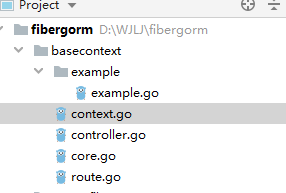在框架里,我们需要有更强大的 Context,除了可以控制超时之外,常用的功能比如获取请求、返回结果、实现标准库的 Context 接口,也都要有。
自己封装的 Context 最终需要提供四类功能函数:
base 封装基本的函数功能,比如获取 http.Request 结构
context 实现标准 Context 接口
request 封装了 http.Request 的对外接口
response 封装了 http.ResponseWriter 对外接口
边界场景到这里,我们的超时逻辑设置就结束且生效了。但是,这样的代码逻辑只能算是及格,为什么这么说呢?因为它并没有覆盖所有的场景。我们的代码逻辑要再严谨一些,把边界场景也考虑进来。这里有两种可能:
异常事件、超时事件触发时,需要往 responseWriter 中写入信息,这个时候如果有其他 Goroutine 也要操作 responseWriter,会不会导致 responseWriter 中的信息出现乱序?
超时事件触发结束之后,已经往 responseWriter 中写入信息了,这个时候如果有其他 Goroutine 也要操作 responseWriter, 会不会导致 responseWriter 中的信息重复写入?

package basecontextimport ("bytes""context""encoding/json""errors""io/ioutil""net/http""strconv""sync""time")type Context struct {request *http.RequestresponseWriter http.ResponseWriterctx context.Contexthandler ControllerHandler//是否超时标记hasTimeout bool//写保护机制writerMux *sync.Mutex}func NewContext(r *http.Request, w http.ResponseWriter) *Context{return &Context{request: r,responseWriter: w,ctx: r.Context(),handler: nil,hasTimeout: false,writerMux: &sync.Mutex{},}}// #region base functionfunc (ctx *Context) WriterMux() *sync.Mutex {return ctx.writerMux}func (ctx *Context) GetRequest() *http.Request {return ctx.request}func (ctx *Context) GetResponse() http.ResponseWriter {return ctx.responseWriter}func (ctx *Context) SetHasTimeout() {ctx.hasTimeout = true}func (ctx *Context) HasTimeout() bool {return ctx.hasTimeout}// #endregionfunc (ctx *Context) BaseContext() context.Context {return ctx.request.Context()}// #region implement context.Contextfunc (ctx *Context) Deadline() (deadline time.Time, ok bool) {return ctx.BaseContext().Deadline()}func (ctx *Context) Done() <-chan struct{} {return ctx.BaseContext().Done()}func (ctx *Context) Err() error {return ctx.BaseContext().Err()}func (ctx *Context) Value(key interface{}) interface{} {return ctx.BaseContext().Value(key)}// #endregion// #region query urlfunc (ctx *Context) QueryInt(key string, def int) int {params := ctx.QueryAll();if vals, ok := params[key]; ok {len := len(vals)if len > 0 {intval, err := strconv.Atoi(vals[len-1])if err != nil{return def}return intval}}return def}func (ctx *Context) QueryString(key string, def string) string{params := ctx.QueryAll();if vals, ok := params[key]; ok {len := len(vals)if len > 0 {return vals[len - 1]}}return def}func (ctx *Context) QueryArray(key string, def []string) []string{params := ctx.QueryAll();if vals, ok := params[key]; ok {return vals}return def}func (ctx *Context) QueryAll() map[string][]string{if ctx.request != nil{return map[string][]string(ctx.request.URL.Query())}return map[string][]string{}}// #endregion// #region form postfunc (ctx *Context) FormInt(key string, def int) int {params := ctx.FormAll()if vals, ok := params[key]; ok {len := len(vals)if len > 0 {intval, err := strconv.Atoi(vals[len-1])if err != nil {return def}return intval}}return def}func (ctx *Context) FormString(key string, def string) string {params := ctx.FormAll()if vals, ok := params[key]; ok {len := len(vals)if len > 0 {return vals[len-1]}}return def}func (ctx *Context) FormArray(key string, def []string) []string{params := ctx.QueryAll();if vals, ok := params[key]; ok {return vals}return def}func (ctx *Context) FormAll() map[string][]string{if ctx.request != nil{return map[string][]string(ctx.request.PostForm)}return map[string][]string{}}// #endregion// #region application/json postfunc (ctx *Context) BindJson(obj interface{}) error {if ctx.request != nil {body, err := ioutil.ReadAll(ctx.request.Body)if err != nil {return err}ctx.request.Body = ioutil.NopCloser(bytes.NewBuffer(body))err = json.Unmarshal(body, obj)if err != nil {return err}} else {return errors.New("ctx.request empty")}return nil}// #endregion// #region responsefunc (ctx *Context) Json(status int, obj interface{}) error {if ctx.HasTimeout() {return nil}ctx.responseWriter.Header().Set("Content-Type", "application/json")ctx.responseWriter.WriteHeader(status)byt, err := json.Marshal(obj)if err != nil {ctx.responseWriter.WriteHeader(500)return err}ctx.responseWriter.Write(byt)return nil}func (ctx *Context) HTML(status int, obj interface{}, template string) error {return nil}func (ctx *Context) Text(status int, obj string) error {return nil}
package basecontextimport ("context""encoding/json""fmt""log""net/http""strconv""time")type ControllerHandler func(c *Context) errorfunc FooControllerHandler(c *Context) error {finish := make(chan struct{}, 1)panicChan := make(chan interface{}, 1)durationCtx, cancel := context.WithTimeout(c.BaseContext(), time.Duration(1*time.Second))defer cancel()// mu := sync.Mutex{}go func() {defer func() {if p := recover(); p != nil {panicChan <- p}}()// Do real actiontime.Sleep(10 * time.Second)c.Json(200, "ok")finish <- struct{}{}}()select {case p := <-panicChan:c.WriterMux().Lock()defer c.WriterMux().Unlock()log.Println(p)c.Json(500, "panic")case <-finish:fmt.Println("finish")case <-durationCtx.Done():c.WriterMux().Lock()defer c.WriterMux().Unlock()c.Json(500, "time out")c.SetHasTimeout()}return nil}func Foo(request *http.Request, response http.ResponseWriter) {obj := map[string]interface{}{"errno": 50001,"errmsg": "inner error","data": nil,}response.Header().Set("Content-Type", "application/json")foo := request.PostFormValue("foo")if foo == "" {foo = "10"}fooInt, err := strconv.Atoi(foo)if err != nil {response.WriteHeader(500)return}obj["data"] = fooIntbyt, err := json.Marshal(obj)if err != nil {response.WriteHeader(500)return}response.WriteHeader(200)response.Write(byt)return}// func Foo2(ctx *framework.Context) error {// obj := map[string]interface{}{// "errno": 50001,// "errmsg": "inner error",// "data": nil,// }// fooInt := ctx.FormInt("foo", 10)// obj["data"] = fooInt// return ctx.Json(http.StatusOK, obj)// }// func Foo3(ctx *framework.Context) error {// rdb := redis.NewClient(&redis.Options{// Addr: "localhost:6379",// Password: "", // no password set// DB: 0, // use default DB// })// return rdb.Set(ctx, "key", "value", 0).Err()// }
package basecontextimport ("log""net/http")type Core struct {router map[string]ControllerHandler}func NewCore() *Core {return &Core{router: map[string]ControllerHandler{}}}func (c *Core) Get(url string, handler ControllerHandler) {c.router[url] = handler}func (c *Core) ServeHTTP(response http.ResponseWriter, request *http.Request) {log.Panicln("core.serveHTTP")ctx := NewContext(request, response)// 一个简单的路由选择器,这里直接写死为测试路由foorouter := c.router["foo"]if router == nil {return}log.Println("core.router")router(ctx)}
package basecontextfunc RegisterRouter(core *Core) {// core.Get("foo", framework.TimeoutHandler(FooControllerHandler, time.Second*1))core.Get("foo", FooControllerHandler)}
package exampleimport ("github.com/programmerug/fibergorm/basecontext""net/http")func test() {core := basecontext.NewCore()basecontext.RegisterRouter(core)server := &http.Server{Handler: core,Addr: ":8888",}server.ListenAndServe()}

